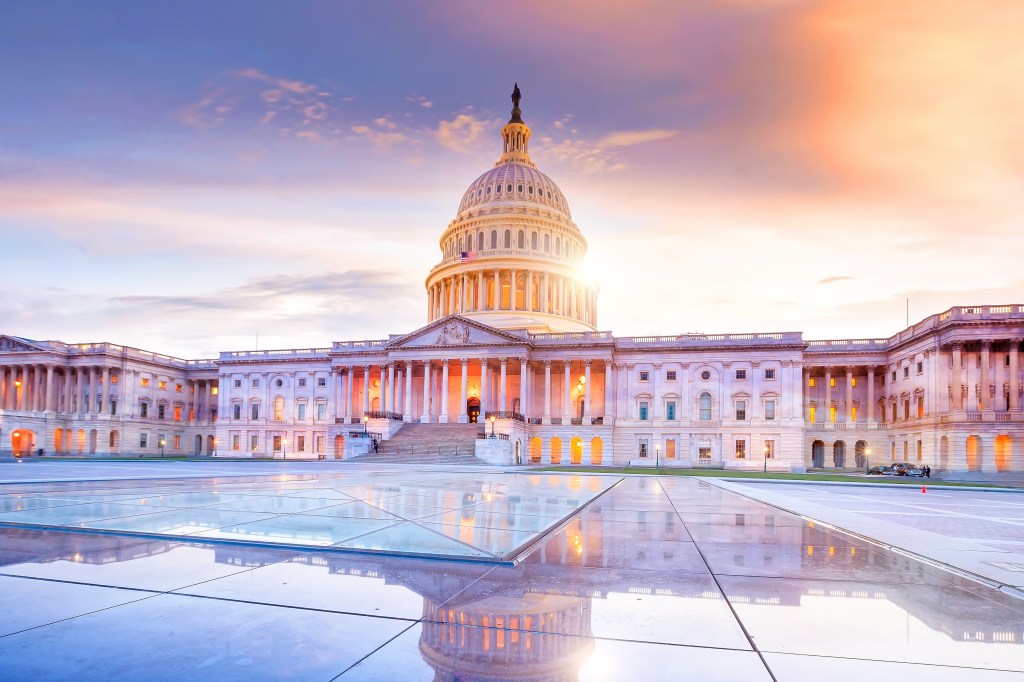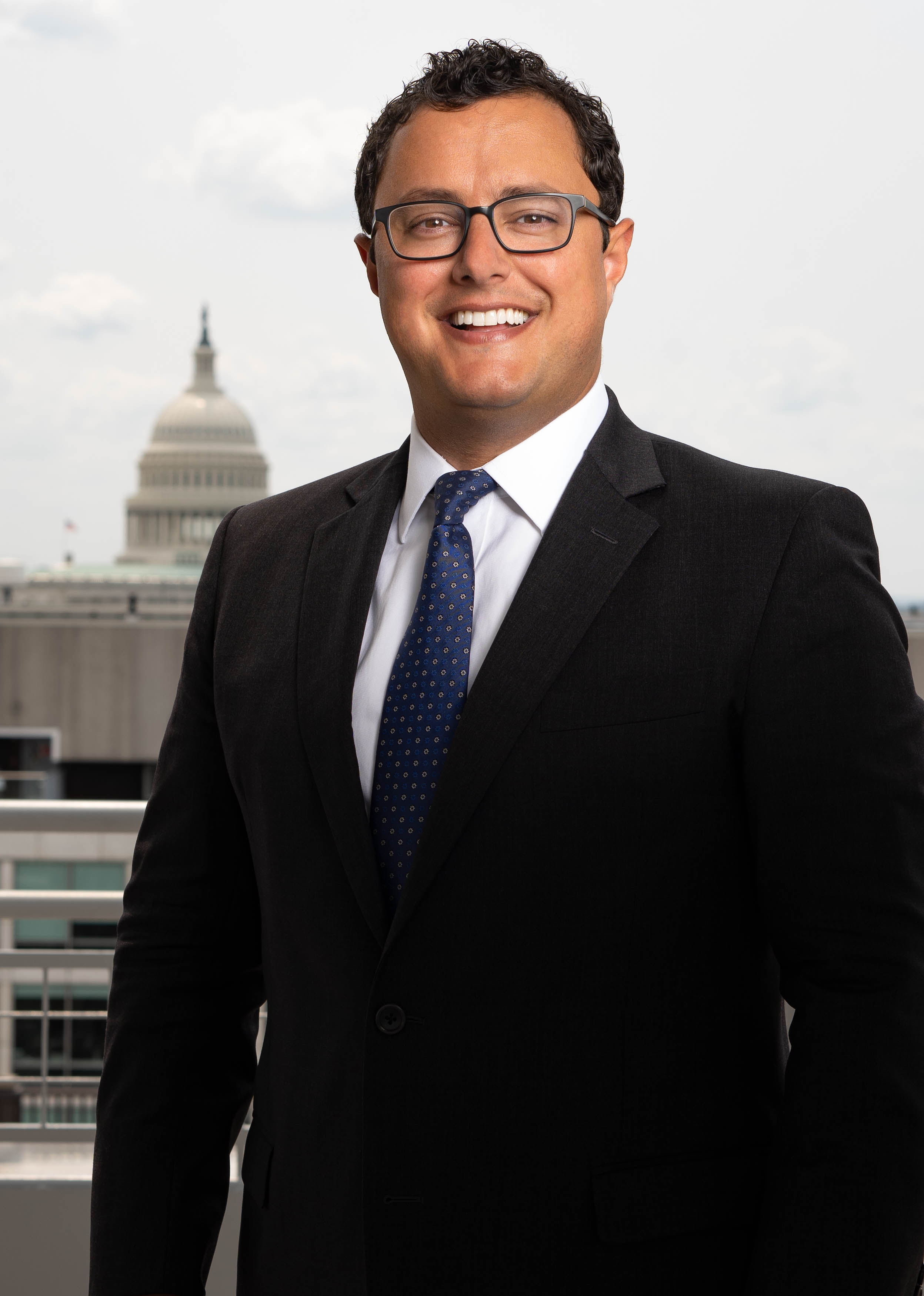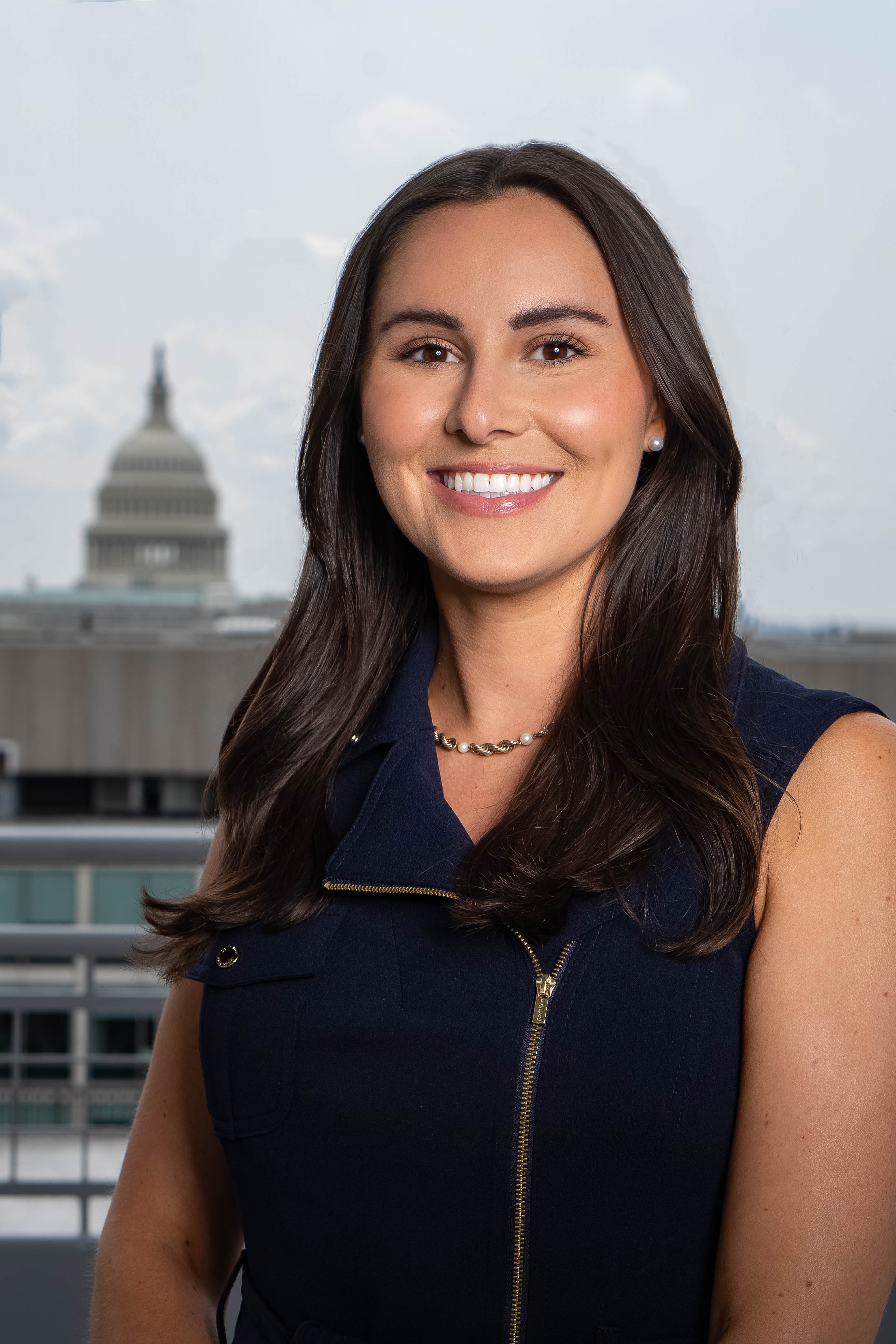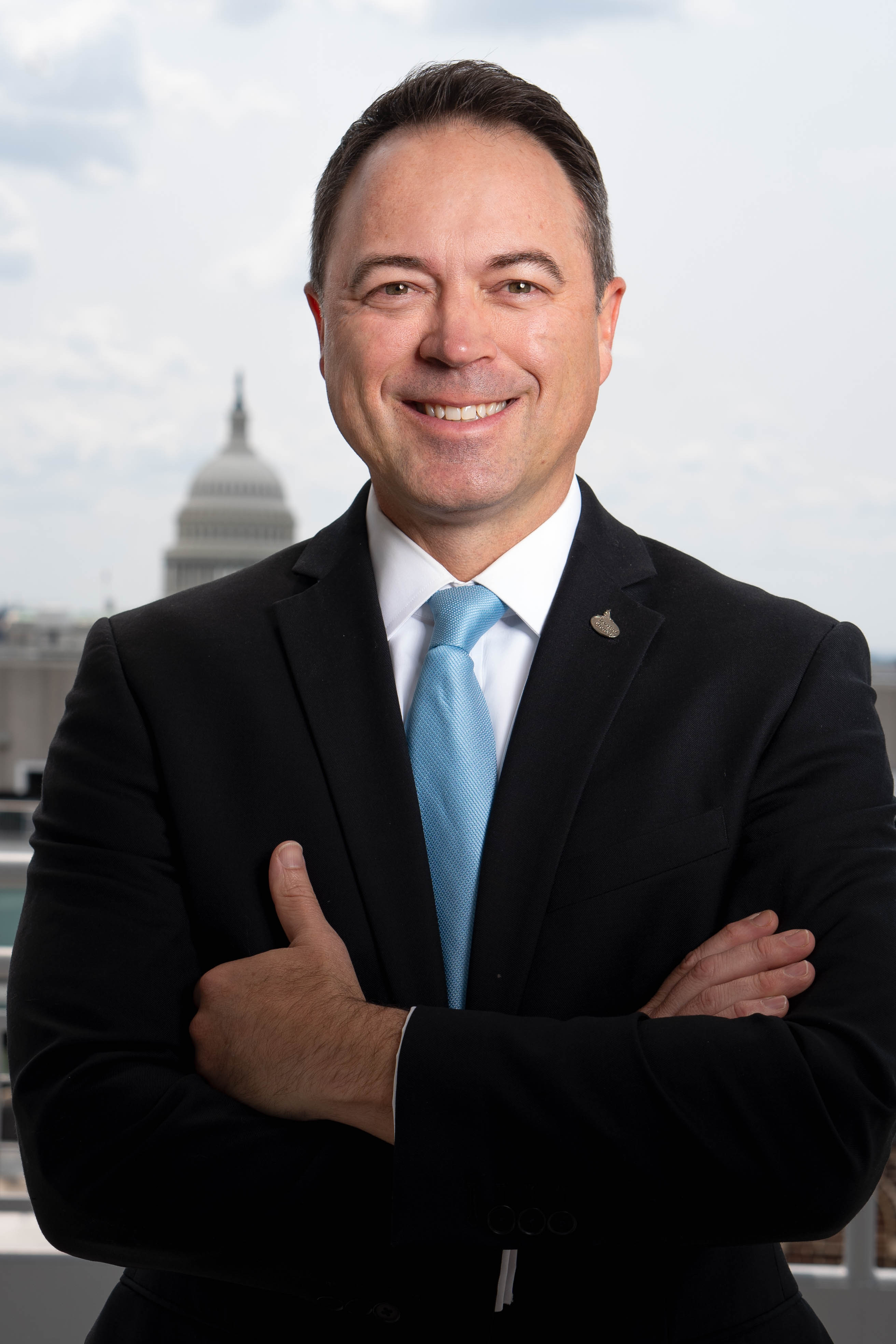
Government Affairs.
While independent agents look out for their communities, the Big “I” looks out for them—on Capitol Hill and beyond.
The Big “I” Advocates for You.
The Big “I” is consistently ranked among the most effective advocacy groups on Capitol Hill. Backed by a multi-million dollar PAC (InsurPac) and a national network of 20,000 independent agency leaders, we advocate for the issues that matter to your business, your employees and the clients you serve.
Simply put, the Big “I” keeps agents informed and represented—staying on top of issues like taxes, crop insurance and legal reform, so you can stay focused on your business.

Save the Date for the 2026 Big “I” Legislative Conference.
Issues Important to Independent Agents.

Taxes

Legal Reform

Disaster Mitigation

Flood Insurance

Insurance Regulation

Crop Insurance
Meet the Big “I” Capitol Hill Team.

Raaed Hadad
Director of Federal Government Affairs

Corey Miller
Director of Federal Government Affairs

Molly Abboud
Director of Political Affairs

Nathan Riedel
Senior Vice President of Federal Government Affairs
Donors
In the last year.
Million
In the last year.
Important Issues Summaries.
May 1, 2025
The Big “I” supports The Main Street Tax Certainty Act (S.213/H.R.703), introduced by Sen. Steve Daines (R-MT) and Rep. Lloyd Smucker (R-PA), which would make permanent the 20% small business deduction for pass-through entities that was passed as part of the TCJA. The deduction, which is scheduled to expire at the end of 2025, is heavily relied upon by many Big “I” members to keep their agencies operating, meet payroll, and better serve consumers and their communities. According to the 2024 Big “I” Agency Universe Study, 86% of independent insurance agencies are organized as pass-through entities. These entities have factored this deduction into their operations and its expiration would result in a tax increase on them and many other small businesses. Such an increase would create an unlevel playing field and put pass-throughs at a disadvantage to those businesses filing taxes at the lower corporate rate that was made permanent in the 2017 Act.
As Congress considers significant tax reform, the Big “I” is advocating to not eliminate or cap the employer tax exclusion for health insurance. Employer-sponsored coverage is the foundation of American health care, providing stable financial protection for nearly 180 million workers and their families. Taxing this coverage would not only increase costs for employees, but also undermine the accessibility and affordability of health care. Historically, employer-sponsored insurance has been tax-free, allowing employees to receive benefits without additional financial burden. Should this change, employees would face higher tax burdens or increased out-of-pocket healthcare costs, while employers might respond by reducing benefits or shifting more costs onto workers. This could lead to less affordable healthcare and potentially disrupt coverage for millions.
The tax-exempt status for 501(c) organizations, such as trade associations, has also come under scrutiny. The Big “I” is asking Congress to oppose any proposals that would eliminate tax-exempt status for associations, or subject royalty income derived from the licensing of a tax-exempt organization’s name or logo to UBIT. Royalties have historically been treated as passive income and are a significant source of non-dues revenue for associations that can be reinvested in education, skills training, research, and other activities. Like the rest of the business sector, associations are continually evolving to stay relevant for their members by offering innovative programs and services that advance the industries or professions they represent. Organizations that are wholly reliant on membership dues for income are in danger of becoming obsolete. Non-dues revenue helps nonprofit organizations weather economic downturns and provide consistent support and services to their memberships, who are often important employers in local communities.
May 1, 2025
The Big “I” urges Congress to:
- Support pre-disaster mitigation efforts, including the Fix Our Forests Act (H.R.471), the Disaster Resiliency and Coverage Act of 2025 (H.R.1105), and the Disaster Mitigation and Tax Parity Act of 2025 (S.336/H.R.1849).
- Recognize the important role that publicly available data plays in predicting risk.
- Extend the National Flood Insurance Program (NFIP) before its expiration on September 30 and consider a long-term reauthorization of the program.
Natural disasters are becoming more frequent and more severe, placing significant strain on the property and casualty insurance markets. Without effective disaster mitigation, insurers face rising claim costs, homeowners struggle with skyrocketing premiums or lack of coverage, and the federal government is forced to step in with costly disaster relief programs. States are working to increase resiliency and mitigate risks associated with their unique geographies, but the federal government can and should do more to assist with those efforts.
The Big “I” encourages the U.S. Senate to pass the Fix Our Forests Act (H.R.471), introduced by Rep. Bruce Westerman (R-AR). The U.S. House of Representatives has already acted on this important piece of legislation, passing it in January with a strong bipartisan vote. This bill would increase the nation’s resiliency to catastrophic wildfires, improve land use planning and forest management, streamline environmental reviews while deterring frivolous litigation, and help to better protect communities in wildfire-prone regions. The legislation also has provisions to reduce the fuel loads in our nation’s forests including the removal of hazardous trees, the hardening of utility infrastructure, and the adoption of fire-resistant building methods and standards.
The Disaster Resiliency and Coverage Act of 2025 (H.R.1105), introduced by Rep. Mike Thompson (D-CA), empowers individual property owners to undertake targeted resiliency and mitigation activities. The legislation would extend the eligible use of funds offered under the Stafford Act to allow states and tribal governments to offer grants up to $10,000 to individual property owners to undertake pre-disaster mitigation activities. The legislation creates tax parity by ensuring that federal and state disaster grants are not subject to federal income tax and allows for a tax credit of up to 30 percent of the cost of qualified mitigation activities. Importantly, the Disaster Mitigation and Tax Parity Act of 2025 (S.336/H.R.1849), introduced by Sen. Thom Tillis (R-NC) and Rep. Doug LaMalfa (R-CA), similarly excludes funds provided under state-based mitigation programs from federal taxable income.
The insurance industry relies on a steady flow of publicly available data to predict losses, price policies, and mitigate financial exposure. For example, the National Oceanic and Atmospheric Administration (NOAA) produces important data on hurricane frequency, wildfire patterns and changes to flood zones. Without that data, insurers may face reduced accuracy in underwriting, higher loss ratios, and an inevitable increase in premiums for policyholders. We encourage Congress to recognize the important role that NOAA and other federal agencies play in providing data to help predict risk and protect consumers.
The NFIP plays a critical role in mitigating risk by providing flood insurance to homeowners and businesses in high-risk areas. The Big “I” strongly supports a long-term reauthorization of a modernized program that would increase take up rates, both in the NFIP and in the private market. However, in the absence of such action the Big “I” asks that the NFIP be reauthorized before its September 30 expiration. The Big “I” also opposes any policies that would harm the Write-Your-Own Program or undermine the valuable and trusted role that independent agents play in the offering, sale, and servicing of flood insurance.
May 1, 2025
According to a study conducted by the Institute for Legal Reform, costs and compensation paid into the U.S. tort system reached over $529 billion in 2022 – equating to 2.1% of U.S. GDP and over $4,200 per U.S. household. The study also found that tort costs continue to grow faster than inflation, at an average annual rate of 7.1% between 2016 and 2022. If tort cost growth continues at that pace, U.S. tort costs will near $1 trillion by 2030.
An especially troubling trend is the unchecked way foreign entities and sophisticated investors are financing and subsidizing litigation in American courts. TPLF is a growing and largely secretive multi-billion-dollar industry that threatens the integrity of the U.S. Court System. Civil litigation cases are being funded by undisclosed third parties who receive a percentage of the settlement from successful cases. Many of these funders are foreign entities, including sovereign wealth funds, and are operating through shell companies. In 2023 there was an estimated $17 billion in global TPLF assets with half of it deployed in the U.S., and that is expected to grow to $31 billion in the U.S. by 2028, according to Swiss Re.
In most jurisdictions defendants are required to disclose insurance agreements in litigation, but litigation funding agreements are not subject to such disclosure. Legislators can protect plaintiffs by making sure they are aware when attorneys have committed to share their recovery with a third-party funder, and by prohibiting funders from taking a larger share of the recovery than an injured plaintiff receives. Another effective way to protect consumers is by supporting The Litigation Transparency Act of 2025 (H.R.1109), introduced by Rep. Darrell Issa (R-CA). This bill would require the disclosure of TPLF agreements between investors and parties to civil actions, as well as the disclosure of parties receiving payment in civil lawsuits.
In many cases, third-party litigation funders pay a more favorable tax rate on their share of a court award when compared to the actual injured plaintiff. The profits of domestic funders currently get treated as capital gains for tax purposes, while foreign investors operating through shell companies pay no U.S. taxes on their litigation profits since they are not subject to capital gains. This perversely incentivizes foreign investment in more U.S. litigation.
The Big “I” is supportive of efforts that would close this tax loophole that foreign and domestic TPLF investors have exploited. An appropriate legislative solution would solely impact the funders and would not create a new tax on actual plaintiffs or their attorneys, nor would it prevent or impede the financing of lawsuits by a third party – it would only ensure that appropriate taxes are being paid.
May 1, 2025
According to a study conducted by the Institute for Legal Reform, costs and compensation paid into the U.S. tort system reached over $529 billion in 2022 – equating to 2.1% of U.S. GDP and over $4,200 per U.S. household. The study also found that tort costs continue to grow faster than inflation, at an average annual rate of 7.1% between 2016 and 2022. If tort cost growth continues at that pace, U.S. tort costs will near $1 trillion by 2030.
An especially troubling trend is the unchecked way foreign entities and sophisticated investors are financing and subsidizing litigation in American courts. TPLF is a growing and largely secretive multi-billion-dollar industry that threatens the integrity of the U.S. Court System. Civil litigation cases are being funded by undisclosed third parties who receive a percentage of the settlement from successful cases. Many of these funders are foreign entities, including sovereign wealth funds, and are operating through shell companies. In 2023 there was an estimated $17 billion in global TPLF assets with half of it deployed in the U.S., and that is expected to grow to $31 billion in the U.S. by 2028, according to Swiss Re.
In most jurisdictions defendants are required to disclose insurance agreements in litigation, but litigation funding agreements are not subject to such disclosure. Legislators can protect plaintiffs by making sure they are aware when attorneys have committed to share their recovery with a third-party funder, and by prohibiting funders from taking a larger share of the recovery than an injured plaintiff receives. Another effective way to protect consumers is by supporting The Litigation Transparency Act of 2025 (H.R.1109), introduced by Rep. Darrell Issa (R-CA). This bill would require the disclosure of TPLF agreements between investors and parties to civil actions, as well as the disclosure of parties receiving payment in civil lawsuits.
In many cases, third-party litigation funders pay a more favorable tax rate on their share of a court award when compared to the actual injured plaintiff. The profits of domestic funders currently get treated as capital gains for tax purposes, while foreign investors operating through shell companies pay no U.S. taxes on their litigation profits since they are not subject to capital gains. This perversely incentivizes foreign investment in more U.S. litigation.
The Big “I” is supportive of efforts that would close this tax loophole that foreign and domestic TPLF investors have exploited. An appropriate legislative solution would solely impact the funders and would not create a new tax on actual plaintiffs or their attorneys, nor would it prevent or impede the financing of lawsuits by a third party – it would only ensure that appropriate taxes are being paid.
May 1, 2025
While some state regulatory environments are more challenging than others, the state system has effectively supervised insurance markets for over 150 years. It continues to offer considerable benefits especially in the vital areas of solvency regulation and consumer protection. Congress has repeatedly affirmed the states’ regulatory authority over the insurance industry, including passage of the McCarran-Ferguson Act in 1945.
While there was not a wholesale change to the way that insurance was regulated after the 2008 financial crisis, the 2010 Dodd-Frank Wall Street Reform and Consumer Protection Act (Dodd-Frank) did give some federal agencies heightened oversight over insurance companies. Dodd-Frank created the Federal Insurance Office (FIO) – an information gathering body housed within the Department of Treasury.
There has been growing concern that federal regulatory efforts could lead to an erosion of the state-based system, market consolidation and an uneven playing field for insurance companies, leading to fewer markets for independent agents. Since its creation, FIO has proven to have questionable value for insurance markets as well as consumers. As one of the leading supporters of a strong and modernized state-based system of insurance regulation, the Big “I” supports eliminating FIO or significantly reducing its size and scope.
May 1, 2025
The Federal Crop Insurance Program (FCIP) is a public-private partnership that provides farmers with financial protection against crop losses due to natural disasters, market fluctuations, and other unforeseen risks. Administered by the Risk Management Agency (RMA) under the U.S. Department of Agriculture (USDA), the program offers a range of insurance policies tailored to different crops, regions, and farming operations. By sharing risk between the government and private insurers, the FCIP ensures that farmers have access to affordable and effective coverage while reducing the need for ad hoc government disaster relief, making it a cost-effective approach to agricultural risk management.
Farming is an inherently risky business. Weather events such as droughts, floods, hail, and hurricanes can devastate crops, leading to significant financial losses. Additionally, fluctuating commodity prices can impact farm revenue. Without crop insurance, many farmers would struggle to recover from these challenges, jeopardizing their livelihoods and the stability of the agricultural sector. Beyond individual farm protection, crop insurance contributes to national food security. A reliable domestic food supply reduces dependence on imports, ensuring that the nation can sustain itself during global conflicts, economic instability, or supply chain disruptions.
Crop insurance agents play a vital role in the success of the FCIP. These professionals help farmers navigate the complexities of insurance policies, ensuring they select the best coverage for their specific needs. Agents provide valuable insights on policy options, coverage levels, and deadlines, while also assisting with claims in times of loss. Their expertise ensures that farmers receive the financial protection they need to sustain their operations and contribute to a resilient agricultural economy.
The Big “I” encourages Congress to support America’s agriculture economy and oppose any legislative or regulatory efforts to reduce the FCIP’s funding or otherwise weaken the efficient and effective private sector delivery of crop insurance.